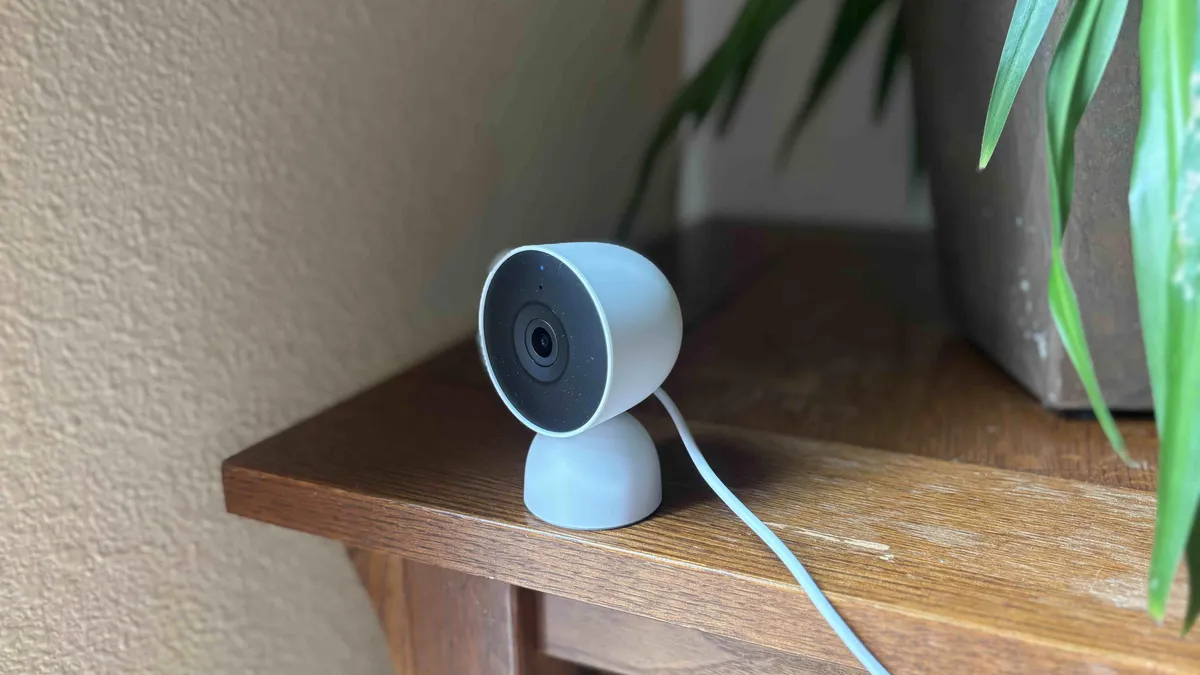Copyright CNET

It's been several years since Google Nest updated its camera line with new options, but now there's a new line of Nest Cams, sporting a compact design, higher resolution and most notably, full compatibility with Gemini for Home AI tricks. Of course, I had to try one out. The Nest Cam Gen 3 indoor model ($100 but currently on sale for $75) comes with plenty of improvements and a Gemini AI model trained to give you thorough descriptions whenever it detects and records an event…if you don't mind paying for it. Here's everything I learned in my testing of the camera in multiple spots around my home, and how the most advanced AI home security features on the market work. Don't miss any of our unbiased tech content and lab-based reviews. Add CNET as a preferred Google source. A compact indoor design that brings the heat -- but no battery option The most obvious changes to Nest's indoor camera are in the physical design, which now sports a far more compact form and a better-protected lens, which is great to see. Part of the reason is that this cam no longer has a battery and is currently available as a wired model only, so it can save on space. I have mixed feelings about this: As an indoor camera, the Gen 3 is likely to be placed near an outlet anyway, but I love battery-powered cams for their versatility and it was one of my favorite parts of the Nest Cam Gen 2. On the plus side, the cam includes options for both a table and a wall mount, so you do have placement options. The Nest Cam Gen 3 lens also received a large upgrade, moving to a 2K resolution and 152-degree field of view, plus a 6x digital zoom. Those enhancements give the video view a bit of a fish lens effect, but it covers a lot of ground -- important for the AI features I talk about below -- and the results were very clear in the app, with particularly low latency. The HDR night vision likewise performed very well. The cam also brings back its two-way audio features, which are clear enough for indoor use and picks up on the details. You can adjust audio recording on or off during camera setup to match the recording laws of your state. That setup is all done through the Google Home app and is particularly speedy as long as you have the Home app set up, signed in and updated. My one concern during testing was that the Nest Cam Gen 3 runs hot -- the hottest security camera I've ever tried, to the point I was worried for its survivability every time I adjusted it. The cam performed without a hitch, but that heat output does make me wonder about its long-term wear and tear. It could also be a reason there's no battery version at this time. Gemini for Home offers the biggest changes for users A more compact cam and a much higher resolution are great for users, but the most important feature in this Gen 3 camera is the full rollout of Google's Gemini AI features, here tailored to security cameras in a version called Gemini for Home (also coming to Nest hubs, Google smart speakers and all things Google Home). Gemini for Home comes paired with a new, streamlined Google Home app, simplified into three sections with a new layout for reviewing video footage. Just as I've found Gemini for Home a significant improvement on the now-outdated Google Assistant, so I thought the new Google Home app was a notable improvement. When subscribed to (more at than in a minute) and enabled in settings, Gemini for Home offers several tricks. First, it adds descriptions to all its video alerts, so instead saying, "Person detected" they saw things like, "A person walking two dogs passes by." These descriptive alerts are the big new 2025 improvement in security cameras, with Arlo, Ring and other brands offering similar features. I found Gemini's version to be particularly accurate. Tap the search/conversation bar at the top of the app, and you can ask Gemini for Home nearly anything. For security cameras like this, that means you can ask Gemini where a bicycle went, who dropped off a package, what the dog did all day inside and so on. The AI will dig through the video history and provide a generally informative summary for you. Gemini doesn't always get it right: Sometimes it recognized my cat as a person, and it made some other vague mistakes, like thinking a planter was a black bowl. Basic notifications like seeing a person or package generally come a second or two before Gemini's more in-depth video descriptions, leading to overlapping alerts that requires new settings to fix. But overall, it provides a level of accuracy that no other home security cam can currently reach, making this new option ideal for those who want to embrace home AI. Even without hands-on questioning, Gemini for Home is set to produce daily summaries. If you don't like getting many alerts or reviewing video footage, these summaries may be especially helpful. They describe everything the camera noticed in the day, including what people were doing, what they were wearing and so on -- at least, everything Gemini thinks is important, but that can be tweaked or narrowed down with more requests. I found these daily summaries added the most value during busy days, but even the in-depth alert descriptions can be nice, especially when Gemini noticed things like, "A UPS truck has stopped nearby." These features aren't like having a full conversation with the AI, but they can be big timesavers. The catch is the cost: You'll need the advanced version of the Google Home Premium plan (Nest Aware is now a thing of the past), which is $20. That's very steep compared to basic $5 to $10 home security camera subscriptions, although affordable compared to many professional monitoring services. Other intelligent video alert descriptions and video searches have similar pricing, give or take. Ring's AI daily summaries kick in at $10 per month, but video descriptions only start at the $20 plan. Arlo only adds advanced descriptions and search at the $25 plan, but that also includes professional monitoring services, so it's a lot more bang for the buck. Even Alexa Plus costs $20 per month without an Amazon Prime subscription, making this the general cost range for adding such AI advantages. That's not for everyone (and AI will likely be trained on the videos it scans), but it is a powerful option that makes home security video much better. New free features for Nest cams One of my favorite things about Nest cameras is the free stuff you get if you don't want to pay for subscriptions. In past models, that included three free hours of video storage so you have time to check on and save clips before they disappear, as well as free object detection for things like people and packages, something that often costs a fee. In this, the third generation of Nest cams offers something even better. Basic object detection remains free, and the three free hours of cloud storage has been increased to six hours, giving you even more time to check on events. If you do want more permanent cloud storage, you can buy a Google Home Premium subscription, which costs $10 per month and adds 30-day video storage. Again, this also gets you smarter alerts and some Gemini for Home features, but you'll have to spring for the $20 package to get the full video searches and summaries. Final thoughts on the Nest Cam Gen 3 The Nest Cam was due for an update, and this new generation is a sizable step forward, including not only an updated design but also Gemini for Home AI. Gemini for Home shows some real value here, especially in its alert descriptions and customizable daily summaries -- although I'm not sure it's worth a full $20 per month, especially when some other options are cheaper. I just wish there were battery options instead of a wired-only camera. Keep in mind, most of the features, from Gemini for Home to the 2K resolution, are available on the Nest Gen 3 wired outdoor model and the Nest Gen 3 video doorbell too, so you can pick the device of your choice and get just about everything I discuss in this review.



